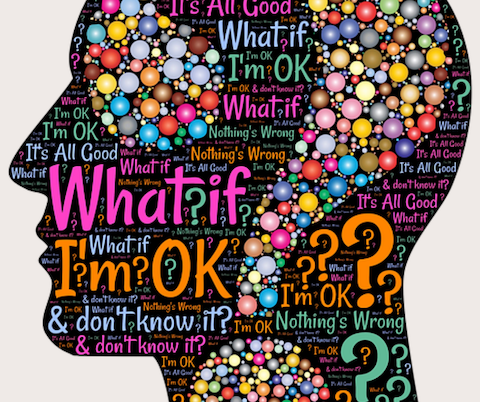How to Stop Worrying About Health
Are you constantly worrying about getting a disease? Or believe you may already have one, OR even a few? Do you excessively Google symptoms you think you’re experiencing? Do you worry about diseases more than the average person? You may be asking yourself, “Am I a Hypochondriac?” or “Why am I a Hypochondriac?” and these may be valid questions.
As someone who suffered from hypochondria for many years, I can tell you that it’s a terrible feeling to constantly worry about health. I completely understand how health anxiety symptoms seem so real. I suffered from hypochondria for a majority of my youth and it’s something that haunted me throughout my teenage years and early 20’s. I was able to completely overcome it and I’ve been hypochondria free for over 10 years now, so I’m confident that you can do the same!
What is a hypochondriac?
Hypochondria, more recently known as health anxiety, is a condition in which someone believes they have a serious or life-threatening illness, despite having few or no symptoms at all. It’s common for a hypochondriac to believe they have new illnesses they hear about, which they usually justify through mild or non-existent symptoms. Health anxiety also involves conditions in which illnesses are in fact present, but a hypochondriac may believe their illness is worse than it actually is.

Am I A Hypochondriac? Do You Experience Any of the Health Anxiety Symptoms Below?
- Excessively worrying about having or getting a serious illness
- Constantly checking your body for symptoms associated with disease
- Overly concerned with minor symptoms or normal body sensations and believe they may be associated with a life-threatening illness
- Overly frightened about health status and test results
- Avoid going to the doctors in fear that they may diagnose you with a serious illness
- OR going to the doctor excessively, yet finding little or no reassurance by negative test results
- Constantly talking about health and diseases
- Constantly searching the internet for diseases associated with symptoms you think you may be experiencing
Why Am I A hypochondriac? These Factors Can Increase Your Risk of Health Anxiety
- Already having anxiety or panic disorder. This may predispose you to symptom checking as a result of unusual body sensations
- Losing a family member, someone in your inner circle, or even a favorite celebrity to a life-threatening disease
- Losing a family pet as a young child
- Excessive or chronic stress
- Having a serious illness or watching a loved one battle a serious illness
- Having a mild illness that was thought to be a more serious illness
- Constant symptom checking on the internet
- Having a parent who is a hypochondriac
9 Ways to Stop Worrying About Health Anxiety
1) Eliminate Stress
Stress can cause all kinds of physical symptoms, such as chest pain, rapid heartbeat, aches and pains, lowered immune system, nausea, dizziness, digestive issues, and all kinds of other symptoms. These symptoms can be mistaken for another serious illness when the real cause is stress. A hypochondriac can easily overlook this possibility. For this reason, it would be beneficial to understand your body and how stress might be affecting you physically. Eliminating stress can be very helpful if you want to stop worrying about health. Learn more about stress management.
2) Avoid Stimulants
Avoid Stimulants such as caffeine, alcohol, nicotine, illicit drugs, and sugar. These can cause racing thoughts and trigger a hyperactive nervous system.
3) Promote Relaxation
Promote relaxation through yoga, meditation, exercise, or listening to soothing music. Having a relaxed mind and body will eliminate any physical symptoms associated with stress.
4) Give Google a Break - Stop Symptom Checking
Limit symptom checking on the internet if you find that it’s making your health anxiety worse. Also, avoid articles that tend to focus on the worst-case scenario. It will be very difficult to stop worrying about health if you’re constantly focusing on the worst outcome. If you find that you’re obsessively checking the internet for symptoms and diseases, then it might be time to take a break. Consider going to your doctor and getting a full exam rather than obsessing on the internet.
5) Make a Doctor's Appointment
If you have a fear of doctors and avoiding them at all costs, then try to overcome this fear. You can start by going to your doctor for minor things like vaccinations or checking your cholesterol, and then working your way up to a full exam. I suffered from health anxiety for many years and I can honestly say that going to the doctors for a full exam was the most effective solution to overcoming my hypochondria. Avoiding your fear only makes it worse, while facing your fear diminishes it. You can potentially stop worrying about health anxiety from just 1 doctor visit.
6) Get a Restful Sleep
Getting a good night’s rest can promote a relaxed headspace and reduce stress. Learn more about the causes of sleep deprivation, and how to sleep better.
7) Don't Get Lost in Nighttime Anxiety
Have you ever found that your anxiety worsens throughout the night? Maintaining normal serotonin levels is vital for a healthy mind. Serotonin converts to melatonin when it’s dark and continues to drop throughout the night. Someone with anxiety most likely has lower serotonin levels that drop even lower throughout the night. This could be the reason you find yourself with higher levels of anxiety in the middle of the night. Knowing and understanding how chemicals and hormones affect your body can really help rationalize your negative thoughts. Learn how to increase serotonin levels here.
8) Reprogram Negative Thinking
Learn how to overcome fear by reprogramming your brain to think more positively. Back in the day, our brains were programmed to react strongly to negative stimuli to protect us from danger. However, in this day and age, we no longer need to fear being prey as we once did before. Being that we are predisposed to negative thinking, we need to reprogram our brains to think more positively. The first and most important step to overcoming fear and negative thinking is to acknowledge the thoughts you’re experiencing. As you become aware of your negative thoughts, they will automatically begin to shift. Once you start catching yourself in your negativity, you can shift these thoughts to more positive ones. Listen to your thoughts from an outside perspective and see if there’s a more optimistic way to interpret the situation. You can do this by writing in a journal. Every time you find yourself writing something negative, replace it with something more neutral. Also, anytime you find yourself worrying about health, acknowledge the thought, and try to look at it from a different perspective. Ask yourself if there’s any chance that what you’re feeling could be stress-related? Have you been under more stress lately?” Learn more about overcoming negativity.
9) Avoid Nonsensical News or Other Negative TV Programs
Stop watching those mystery diagnosis shows or other TV programs that can fuel your fear of disease. Also, avoid the media’s negative spiral. The media thrives off of fear and negativity, so make a conscious effort to filter out any unnecessary news you’re listening to. Sometimes ignorance is bliss! You don’t need to know about the violent fight or car accident that happened miles away. Pick and choose what news you feel is absolutely necessary for you to know. The same thing goes for that amazing new drama series that everyone is talking about. Replace the drama for something lighthearted or educational. Who you surround yourself with also plays a big role in your thought process, so try to limit your time spent with those that tend to be more negative. Changing your thought process from negative to positive can really help you stop worrying about health.
If you’re still asking yourself, “am I a hypochondriac?” then consider taking hypochondriac test.
Author Bio

Taleen Keuftedjian is a mental health and wellness enthusiast who coaches others on the importance of whole-body health, which incorporates brain, body, and spirit. She takes a relatable approach where she uses her own personal experiences to help motivate others to live a healthy, happy, anxiety-free life.
Check out my book!
A relatable guide to overcoming anxiety by finding the root cause, and bringing the brain, body, and spirit back into balance. Coming to you from personal experience!


~ Balance the Bossy Brain

Learn more about Habitat for Wellness



I want to to thank you for this excellent read!! I certainly loved every little bit of it. I have got you book-marked to look at new stuff you post…